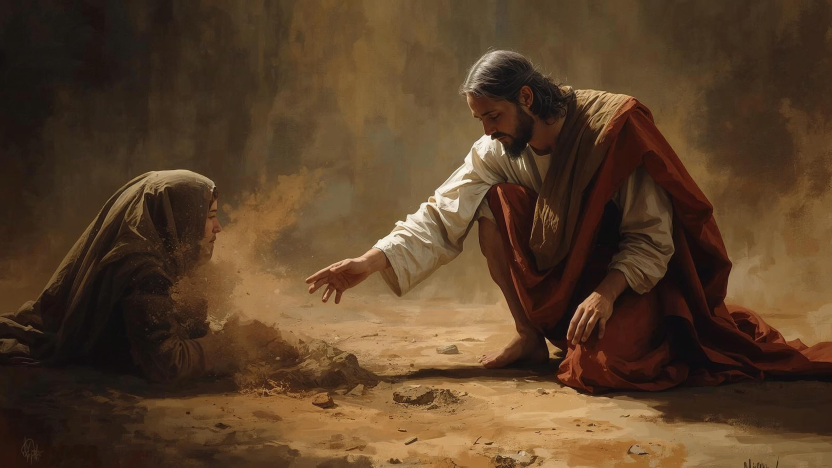The second of Christ’s letters in Revelation was addressed to the church in the ancient city of Smyrna. Many Bible commentators believe Smyrna means “a sweet-smelling savor,” referring to the city’s commercial export, myrrh. This rich spice was associated with death, for it was used to anoint the deceased as they were laid in their sepulchers. It was rich in symbolism to the city, for Smyrna had once been a rich Greek city that had been destroyed by the Lydians in about 600 B.C. and remained unhabituated for 400 years. Then, as the Romans rebuilt the city, it once again became a thriving metropolis. It truly was a city that was dead and then raised to life.
While Smyrna held the largest library in the ancient world, as well as many theaters, pagan temples, and Jewish synagogues, it also harbored an intense animosity towards Christians. The Jewish synagogues were the most vigilant in condemning the Christians to the authorities.1 The killing of Christians was common in those days: “They were stoned, they were sawn asunder, were tempted, were slain with the sword: they wandered about in sheepskins and goatskins; being destitute, afflicted, tormented; (Of whom the world was not worthy:) they wandered in deserts, and in mountains, and in dens and caves of the earth” (Hebrews 11:37-38). Yet, in the midst of torture and death, the Christians of Smyrna held fast to Jesus. Only two of the seven letters include no rebuke, and the letter to the Christians in Smyrna is one of them, for they had remained faithful in the midst of terrible persecution.
Jesus’s first words to this faithful church were that He was “the first and the last, which was dead and is alive” (Revelation 2:8). With this description, Jesus reminded them that He too had faced persecution, even as cruel as death itself. He commended them for their good works, their fidelity during tribulation, and their willingness to suffer poverty in order to remain faithful to Him. At the time trade guilds would usually band together to take care of each other and provide for their families in times of crisis, but when Christians refused to burn incense to Caesar and take oaths of loyalty to the guild’s pagan deities, all assistance was denied. They became targets of persecution. Many believers were in need of food and clothes, and Jesus reassured them that even in their poverty they were truly rich (Revelation 2:9). Future persecutions would come, and church history counts ten periods of persecution in the three centuries following Christ’s birth, the worst during the ten-year persecution under the emperor Diocletian, from A.D. 303–313,2 a time that has been called the “Age of Martyrdom.” The Christians in Smyrna, as well as future Christians, were warned that persecution would continue, but if they remained faithful, they would receive a crown of life. They might give their earthly lives for Jesus, but at the resurrection, these faithful ones would never have to fear death again.
The second-century Christian Polycarp, bishop of Smyrna, was arrested and ordered to burn incense to Caesar or be killed. He famously proclaimed: “Fourscore and six years have I been serving him, and he has done me no wrong; how then can I blaspheme my king who saved me?”3 His example of faithfulness has inspired countless Christians. Tertullian, another leader of the early the Christian church, boldly stated, “You may kill us, torture us, condemn us....Your injustice is the proof that we are innocent…The oftener we are mown down by you, the more in number we grow; the blood of Christians is seed."4 Despite the devil’s attempts to crush infant Christianity, it would not only survive but thrive.
Christ’s promises to Smyrna are also meaningful to those modern Christians who face cruel and violent deaths. In 2019, an estimated 245 million Christians experienced persecution for their faith, with thousands arrested and killed without trial.5 The apostle Peter reminded believers not to be surprised by persecution: “Beloved, think it not strange concerning the fiery trial which is to try you, as though some strange thing happened unto you. But rejoice, inasmuch as ye are partakers of Christ's sufferings; that, when his glory shall be revealed, ye may be glad also with exceeding joy” (1 Peter 4:12–13).
Call to Action
What can you do to help these modern Smyrnans, who daily suffer for their faith? Prayer and financial assistance are welcome in crisis. But more importantly, how can you prepare yourself to remain faithful despite agonizing persecution? Fortify yourself with the promises of God, that you too may wear a crown of life and not be hurt by the second death!
Read Revelation chapter 2 verses 8-11 and reflect on the following questions:
- What specific deeds does Jesus praise the Christians of Smyrna for? Notice that there is no rebuke. See Revelation 2:9.
- What is the first promise spoken by Christ? See Revelation 2:10.
- This crown is a physical one with rich symbolic meaning. How does the Bible describe this crown? See Isaiah 28:5 & 62:3, 2 Timothy 4:8, 1 Peter 5:4, James 1:12, and Revelation 3:11.
- What is the second promise spoken by Christ? See Revelation 2:11.
- Describe the resurrection of the righteous. See Isaiah 25:8–9 & 26:19, 1 Thessalonians 4:16–18, and 1 Corinthians 15:51–57.
- After the righteous are resurrected, they will travel to be with Jesus in heaven. How is heaven described? See Isaiah 11:6–10, 35:5–10, & 65:17–25, and Revelation 21–22.
- Before Jesus returns, are we to expect persecution? See Matthew 24:21–22 and 1 Peter 4:12–13.
- What other Bible characters experienced intense persecution, yet were miraculously delivered? See Jeremiah 37–38, Daniel 3, and Daniel 6.
- What Bible characters experienced intense persecution but instead of being miraculously delivered, gave their lives instead? See Matthew 14:1–14 and Acts 6–7.
- Many have wondered why John the Baptist was not delivered from death. It has been said that “But for the sake of thousands who in after years must pass from prison to death, John was to drink the cup of martyrdom.”6Ten of the 12 disciples died a martyr’s death, and their conduct in the midst of tribulation has inspired countless Christians worldwide. Why do you think their deaths encourage other believers?
- We do not know if we will one day give our lives for God, but we can prepare for difficult times by fortifying our minds with the promises of God. See Psalm 23, 46, and 91 are some of the most commonly memorized passages by Christians throughout the centuries. What are some of your favorites that comfort you in difficult times?
All scripture taken from the King James Version.
- Acts 13:45; 14:2,19; 17:5, 13; 18:5, 6, 12; 21:27
- Foxe, John. Foxe’s Book of Martyrs. Pg. 19-45
- Eusebius. “The History of the Church” Book IV Chapter XIV.
- Tertullian. “Apology” Paragraph 50.
- https://www.opendoorsusa.org/christian-persecution/stories/christian-persecution-by-the-numbers/
- White, Ellen G. “The Desire of Ages”. Pg. 224.




